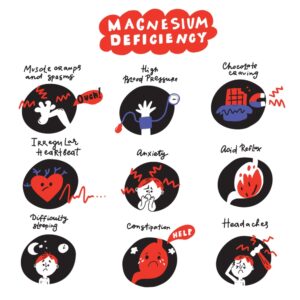What's On This Page?
ToggleIf you’ve ever wondered why you’re tired, anxious, experiencing weird muscle twitches, or struggling with blood sugar or thyroid issues, there might be a simple explanation hiding in plain sight: magnesium deficiency.
Magnesium is the “calm down” mineral. It keeps your heart steady, your mood stable, your muscles relaxed, and your blood sugar balanced. And yet, it’s quietly depleted by dozens of common lifestyle choices, medications, and even “healthy” habits.
I wrote about this extensively in my book Drug Muggers: Which Medications Are Robbing Your Body of Essential Nutrients – and How to Restore Them, but today I want to share a shortlist – 20 things that deplete magnesium, sometimes with serious consequences. Even headaches are a classic sign of magnesium deficiency – most people with headaches and migraines don’t realize that.
20 Hidden Magnesium Muggers
These drugs, habits, and foods rob your body of this vital mineral:
- Proton Pump Inhibitors (PPIs) – like omeprazole (Prilosec®), pantoprazole (Protonix®) and others available over-the-counter (OTC) and by prescription
- H2 Antagonists – like famotidine (Pepcid®) and cimetidine (Tagamet® HB)
- Mylanta & Antacids – impair stomach acid needed for magnesium absorption
- Alcohol – promotes magnesium loss through urine
- Coffee & Caffeine – the diuretic effect flushes out magnesium – read about COFFEE’S UNIQUE IMPACT ON WEIGHT.
- Black Tea & Green Tea – similar diuretic action and tannins interfere with absorption
- Decaf Coffee – yes, even without caffeine, it’s still a mugger!

- Sugar – high sugar intake increases magnesium excretion
- Diuretics – like hydrochlorothiazide (HCTZ) and furosemide (Lasix®), what about natural ones like PARSLEY TEA?
- Birth Control Pills – alter hormone balance and nutrient status
- Corticosteroids – such as prednisone
- Antibiotics – all of them, especially aminoglycosides
- Chemotherapy Drugs – often deplete multiple minerals
- Smoking – yes, smoking lowers magnesium levels
- Cannabis (Weed) – early data suggests it may lower magnesium, especially chronic use
- Celiac Disease – damages the gut, impairing nutrient absorption
- IBS or Crohn’s Disease – similar to celiac, absorption suffers
- High-Stress Lifestyle – stress hormones burn through magnesium reserves
- Excessive Sweating, Hot Yoga or Exercise – magnesium is lost in sweat
- High Calcium or Phosphorus Intake – can displace magnesium from tissues

What Happens When You’re Low in Magnesium?
Magnesium deficiency is a master of disguise. It rarely presents in a textbook way, which is why doctors often misdiagnose the downstream symptoms as standalone diseases.
One patient might show up with high blood pressure, another with anxiety or insomnia, and yet another with muscle cramps or blood sugar issues—all seemingly unrelated. In reality, these symptoms can all stem from the same root cause: low magnesium.
Because the deficiency doesn’t wave a red flag, it often flies under the radar. This leads to prescriptions for each symptom, instead of replenishing the nutrient that could resolve them all.
Mental health problems may increase, not through a direct mag depletion, but more contributory. Magnesium plays a role in regulating neurotransmitters, including serotonin, dopamine, and glutamate—all of which are involved in mood and behavior.
And we already know that studies show that magnesium supplementation may help reduce anxiety and obsessive thoughts in some people, particularly when combined with other treatments (like vitamin B6 or therapy). While magnesium deficiency isn’t listed as a cause of OCD in clinical manuals, it can be a hidden aggravating factor, and correcting it may offer relief or improve the effectiveness of conventional OCD treatments.
You could be labeled with:
- Hypertension – magnesium relaxes blood vessels
- Anxiety or Depression – it’s critical for neurotransmitter balance
- Diabetes or Insulin Resistance – magnesium helps with glucose regulation
- Muscle Cramps or Restless Legs – classic signs of low magnesium
- Neuropathy or Chronic Pain – especially burning, tingling, or numbness
- Osteopenia/Osteoporosis – you need magnesium for calcium to work
- Hypothyroidism – low magnesium disrupts thyroid hormone conversion – READ MORE HERE
- Migraine Headaches – especially in women
- Palpitations, PVCs, or Arrhythmias – because magnesium is an electrolyte
- Chronic Fatigue Syndrome – often linked to adrenal burnout and low magnesium
The Relationship Between Leg Cramps and Magnesium
If you suffer from leg cramps, especially at night, magnesium might be your missing link. This mineral helps muscles relax and prevents the kind of twitchy, painful contractions that wake you up at 2 a.m. Ideally, magnesium should be paired with calcium in about a 2:1 ratio of calcium to magnesium—this balance helps your muscles contract and relax properly.
But here’s something most people miss: Neither calcium nor magnesium will work that well if you’re low in key electrolytes like potassium, sodium, and zinc.
That’s why a small daily dose of Pedialyte (about a cup/day) can make a big difference. It replenishes those supporting minerals and enhances absorption, helping your body actually use the magnesium you’re taking. I’ve seen this combo work wonders – because I’ve lived it. I used to get awful cramps in the months right after my parathyroid surgery, and now I am cured of them because of this combination.
For me, the magic formula was simple but powerful:
– Two chelated magnesium capsules taken at night: Consider MY OWN BRAND – LEARN MORE
– Two calcium citrate with vitamin D tablets (store-bought gummies or petite pills)
– Two cups a day of unflavored Pedialyte® sipped during the day.
This combo finally gave my exactly muscles what they needed, and then the leg cramps stopped. Sometimes I up the dosages if I do hot yoga where a lot of sweating occurs, and dehydration.
Misdiagnosis
Misdiagnosing a new disease, when the real issue is a nutrient deficiency caused by a “drug mugger” effect, can lead to a frustrating and costly medical journey for patients (maybe you have already been down the rabbit hole?).
Instead of addressing the root cause—like a magnesium depletion from long-term medication use, you may be prescribed additional drugs to treat symptoms that are simply signs of deficiency. And think of it, it’s not just magnesium. Drugs deplete selenium, IODINE, vitamin D, ZINC, probiotics, melatonin, VITAMIN C and more. When these nutrients are reduced significantly, your entire hormonal and neurotransmitter system gets jacked up.
In short, nutrient depletions can trigger a vicious cycle of side effects, confusion, and even misdiagnoses. The truth is, you may be healthier than you think! Most doctors are compassionate and doing their best, but drug-induced nutrient depletion isn’t something that’s widely taught in medical school, nursing programs, or PA training – so it often gets missed during the most important part of your visit: the diagnosis!
And yet, it’s a crucial piece of the puzzle that deserves more attention in both prescribing and healing. I hope my article (and my DRUG MUGGERS book if you happen to have it) has changed your life. The information is crucial to you restoring lost nutrients for pennies a day, and this is a lot cheaper than a new diagnosis and all the drugs that come with that!
Final Thoughts (and a Reminder)
Magnesium is one of the most underrated nutrients in the modern world, and its deficiency can mimic serious illnesses. If you’re taking one or more of the items on the list above, or if you have a chronic condition with vague symptoms, you might just need a magnesium-rich diet or targeted supplementation.
I go into all of this – and how to fix it – in much more detail in my book, “Drug Muggers”, available now on Amazon. It could be the answer you’ve been missing.

Suzy Cohen, has been a licensed pharmacist for over 30 years and believes the best approach to chronic illness is a combination of natural medicine and conventional. She founded her own dietary supplement company specializing in custom-formulas, some of which have patents. With a special focus on functional medicine, thyroid health and drug nutrient depletion, Suzy is the author of several related books including Thyroid Healthy, Drug Muggers, Diabetes Without Drugs, and a nationally syndicated column.



